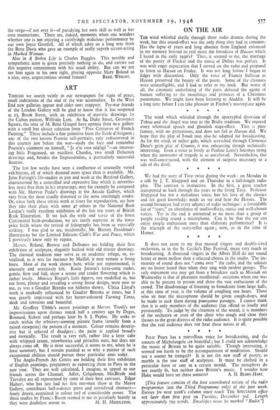ON THE AIR
THE wind whistled shrilly through three radio dramas during the week, but this sound-effect was the only thing they had in common. Has the lapse of years and long absence from England enhanced in my memory beyond its real merit the broadcast of Hassan which I heard in the early 5930's? Then, it seemed to me, the marriage of the poetry of Flecker and the music of Delius was perfect. It was with eager expectation that I turned on the radio and prepared to listen to Hassan on Friday. It was not long before I began to fidget with discomfort. Only the voice of Francis Sullivan as Hassan preserved the beauty of the poem. Some of the choruses were unintelligible, and I had to refer to my book. But worst of all, the cinematic underlining of the parts debased the agony of human suffering to the mouthings and grimaces of a Christmas pantomime. We might have been listening to Aladdin. It will be a long time before I can take pleasure in Flecker's masterpiece again.
The wind which whistled through the apocryphal diversion of Tobias and the Angel was true to the Bridle tradition. We enjoyed every whimsical speech and ghoulish stage-effect. This is pure fantasy, with no pretensions, and does not fail as Hassan did. We hope that the play of Jonah may also be adapted for broadcasting. As for the wind, or rather gale, which screeched through Clemente Dane's grim play of Granite, it was exhausting though technically interesting. Even a voice as lovely as Pauline Letts's becomes tiring when the monotone of tragedy is so unrelieved. Nevertheless, this was well-constructed, with the element of surprise necessary to a tale of the devil.
* * * We had the story of Troy twice during the week: on Monday in a talk by J. T. Sheppard and on Thursday in a full-length radio play. The contrast is instructive. In the first, a great teacher transported us back through the years to the living Troy. Professor Sheppard has not a melodious voice, but his love of the classics and his great knowledge made us see and hear the Heroes. The second broadcast had every adjunct of radio technique : a formidable list of " stars," an abundance of studio-effects, music and well-chosen voices. Yet in the end it amounted to no more than a group of people reading round a microphone. Can it be that the ear can enjoy simple enthusiasm more than elaborate performance? It is the triumph of the story-teller again ; now, as in the time of Homer.
* * * It does not seem to me that massed singers and double-sized orchestras, as in the St. Cecilia's Day Festival, mean very much in broadcasting. A thousand singers in the Albert Hall do not sound better or more mellow than a selected chorus in the studio. The im- mensity of sound does not " come over " the radio, and the soloists are no better heard than when they sing with modest groups. The only enjoyment one may get from a broadcast such as Messiah on Wednesday is that of pleasures recollected : occasions when one was able to be present in person and share the vast enthusiasm of the crowd. The disadvantage of listening to broadcasts from large halls, at this time of year, is the volume of coughing one hears. Those who sit near the microphone should be given cough-drops, and be made to suck them during pianissimo passages. I cannot think that it is only members of the audience that offend so loudly and persistently. To judge by the clearness of the sound, it is members of the orchestra or even of the choir who oough and clear their throats to the great distress of the radio audience. It is quite possible that the real audience does not hear these noises at all.
* * * *
Peter Pears has a marvellous voice for broadcasting, and the sonnets of Michelangelo are beautiful ; but I could not acknowledge the music of Britten to be quite suitable. Though interesting, it seemed too harsh to be the accompaniment of meditation. Should not a sonnet be tranquil? It is not the raw stuff of poetry, as marble is the raw stuff of sculpture. It must be clothed in a particular form or cast in a certain mould. The metaphors do not exactly fit, but neither does Britten's music. I wonder how Hoist would have set these sonnets? A. H. BERRY-HART.
[This feature consists of the best contributed review of the radio programmes (not the Third Programme only) of the past week. Entries for next week's column must reach THE SPECTATOR office not later than first post on Tuesday, December 3rd. Length approximately boo words. Envelopes must be marked "Radio."]


































 Previous page
Previous page